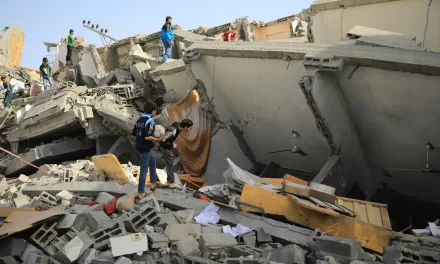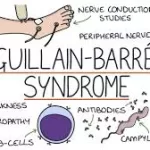
In the aftermath of disasters and conflict, there often exists unwarranted apprehension and misconceptions surrounding deceased individuals. It is crucial for communities to be equipped with the necessary knowledge and resources to handle bodies in a safe and respectful manner. This aids in the recovery process for survivors, emphasized the International Federation of the Red Cross and Red Crescent Societies (IFRC), the International Committee of the Red Cross (ICRC), and the World Health Organization (WHO) in a recent statement.
In situations where a significant number of people succumb to natural disasters or armed conflict, the presence of these bodies can be deeply distressing for affected communities. Some may feel compelled to swiftly inter the deceased, potentially in mass graves, partly in an attempt to alleviate this distress and at times due to concerns about potential health risks posed by the bodies. This approach, as the organizations pointed out, can have adverse effects on the affected population.
Even though local authorities and communities may be under immense pressure to carry out rapid burials, mishandling the deceased can lead to enduring psychological distress for family members, as well as create social and legal challenges. Properly managed burials involve individually marked and meticulously documented graves in designated burial sites. This ensures precise knowledge of each deceased person’s location, along with associated information and personal effects, in accordance with the guidance provided by the organizations, particularly the ICRC/IFRC/WHO Manual for the Management of the Dead After Disasters. Cremations should not take place prior to positive identification of the deceased.
To aid in the improved handling of the deceased, the organizations extend supplies and expertise to local authorities, aiding them in the sometimes overwhelming task of interring the deceased. Presently, in Libya, teams from the Red Cross and WHO are working closely with local authorities, communities, and the Libyan Red Crescent Society, providing them with guidance, materials, and training. Both the ICRC and WHO are also delivering body bags in Libya to facilitate the dignified treatment of the deceased.
In cases where individuals have succumbed to injuries sustained in a natural disaster or armed conflict, there is typically minimal risk to communities from the bodies. This is due to the fact that victims who have died from trauma, drowning, or fire generally do not carry disease-causing organisms, provided standard precautions are observed. Exceptions may arise when deaths occur from infectious diseases like Ebola, Marburg, or cholera, or if the disaster takes place in an area where such infectious diseases are prevalent.
Regardless of the circumstances, deceased bodies near or in water sources can give rise to health concerns, as the bodies may release fecal matter and contaminate water supplies, potentially leading to diarrheal or other illnesses. Bodies should not be left in contact with drinking water sources.
Pierre Guyomarch, head of ICRC’s forensics unit, emphasized, “The belief that dead bodies will cause epidemics is not supported by evidence. We see too many cases where media reports and even some medical professionals get this issue wrong. Those who survive an event like a natural disaster are more likely to spread disease than dead bodies.”
Dr. Kazunobu Kojima, Medical Officer for biosafety and biosecurity in WHO’s Health Emergencies Programme, urged authorities in affected communities to exercise caution, stating, “We urge authorities in communities touched by tragedy to not rush forward with mass burials or mass cremations. Dignified management of bodies is important for families and communities, and in the cases of conflict, is often an important component of bringing about a swifter end to the fighting.”
Gwen Eamer, IFRC’s Senior Officer for Public Health in Emergencies and Head of Emergency Operations for the Morocco Earthquake Response, stressed the significance of allowing appropriate time for the identification and mourning of the deceased, stating, “An unnecessary rush to dispose of bodies of those killed in disasters or conflict deprives families of the opportunity to identify and mourn their loved ones, while providing no public health benefit. Dignified treatment of the dead requires appropriate time to identify the deceased and mourn and perform funeral rites in accordance with local cultural and social norms.”
The ICRC, IFRC, and WHO underscore the following points for authorities and communities:
- While it is distressing to encounter deceased bodies, community leaders and authorities should refrain from hastily conducting mass burials or cremations. Burial or cremation procedures should take into account cultural, religious, and family considerations.
- Bodies of those who succumb to natural disasters or armed conflict are generally not a source of disease.
- Unless the deceased passed away from a highly infectious disease, the risk to the public is minimal. However, there is a risk of diarrhea if water sources are contaminated by fecal material from deceased bodies. Routine disinfection of drinking water is sufficient to prevent waterborne illnesses.
- Swift, disrespectful mass burials or cremations hinder the identification of the deceased and notification to their families, making it more challenging and sometimes impossible.
- The only time deceased bodies pose a risk of epidemics is when the deaths are a result of infectious diseases or when a natural disaster occurs in an area where such a disease is prevalent.
- Lime powder does not expedite decomposition, and as deceased bodies in disaster or conflict situations generally do not pose an infectious risk, there is no need for their disinfection.
- After any contact with the deceased, hands should be washed with soap and water, or cleaned with alcohol-based hand rub if there is no visible soiling.
The ICRC, IFRC, and WHO call upon all parties involved in conflicts, as well as responders in disasters, to adhere to established principles for the management of deceased bodies, for the betterment of society as a whole, and have expressed readiness to offer additional support as required.










